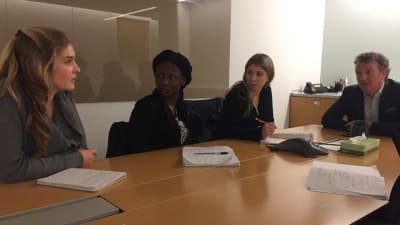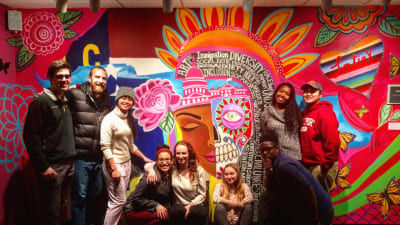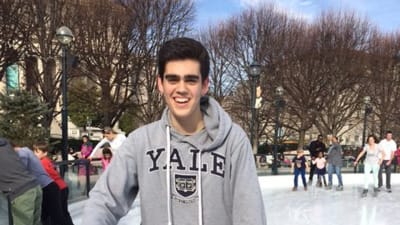Social Ventures, Stage One
Each SEGL student completes three capstone projects: the ethical Credo, the collaborative policy document, and the social venture project. Each is essential to the SEGL experience, and each tests our students’ mettle. The first challenge is the social venture project: a from-the-ground-up business plan to create positive change (for profit or nonprofit), to be implemented upon returning home. Along the way, students gain countless leadership skills (and, perhaps, a nice college admissions boost!). Our social venture journey started last week.
This semester we are again honored to welcome our social venture coach, Joe Weinstein, who works directly with our students over the course of the semester to prep them for their capstone. Weinstein spent years at the Bill & Melinda Gates Foundation as a global health specialist before serving as Senior Director for Strategy and Operations at Arabella Advisors, a leading consulting firm for philanthropic donors. Now the Director of Operations and Planning at Signal Vine, a start-up company that uses text messaging to improve student outcomes, he also advises Georgetown University’s Global Social Enterprise Initiative. Weinstein has an MBA and M.S., in International Affairs, from Georgetown. In short, he has an enormous amount of experience determining what makes a promising venture.
Our introductory social venture week put the students into four groups of six. Each group visited a different DC social initiative (the Natural Resources Defense Council, the National Wildlife Federation, The Sierra Club, and Earthjustice) focused on climate change. (This topic itself is not without political and ethical controversy, and we acknowledged that early in our study.)
Students serves as representatives of the imaginary “Alvin Fridie Foundation” (yes, that’s Alvin, our science teacher!). They researched each organization to determine strengths and weaknesses given the Fridie Foundation’s mission and criteria for funding. These four groups then divided into six new groups of four. In each of these new groups all four members had visited a different venture. And so the debates began: which organization had the soundest finances? The biggest need? The strongest leadership? The best prospects for scalability? Each group could choose only one organization.
On Friday Weinstein returned to play the Director of the Fridie Foundation. Each group suggested a different funding allocation strategy, and each was forced to defend it. Later, as the students reflected as a group, many began to realize the point of the exercise: they could apply the lessons they learned about making an organization worthy of funding to their own SEGL venture project.
Meanwhile, our AP Spanish students visited the Smithsonian Anacostia Community Museum to see an exhibition focused on Latino immigrants, our French students visited the Guinean Embassy and met the Ambassador, and all of our students enjoyed the first spring-like weekend of the term (including skating on the National Mall in 70-degree weather!).
[Pictures below (left to right; top to bottom): nonprofit visits to National Wildlife Federation, Natural Resources Defense Council; presentations/discussion with Joe Weinstein; Smithsonian Anacostia Community Museum; brunch outside SEGL Residence; Leo, SEGL dog-in-residence; ice skating on the National Mall]





























